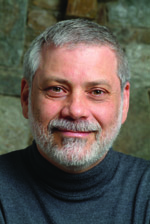By Edwin Black

WASHINGTON–When the last plaintive shofar blast echoed through the Washington D.C. Convention Center of the Christians United for Israel (CUFI) Policy Conference extravaganza of support for Israel, July 13–14, 2015, it was not the record attendance of 5,000 fired-up pro-Israel Christians that marked a turning point for the 10-year old group. Nor was it the several on-stage and pre-recorded presidential candidate interviews—from Jeb Bush to Mike Huckabee, conducted by Bret Stephens of the Wall Street Journal that will be most remembered. Nor was it the video salute from Israeli Prime Minister Benjamin Netanyahu in Jerusalem, nor the blazing oratory of Presidents Conference Vice-Chairman Malcolm Hoenlein that prompted standing ovations.
Instead, it was the quiet 24-minute briefing by CUFI executive director David Brog and CUFI national leader Gary Bauer for a half-dozen national reporters conducted around a circular table in a small non-descript room in a roped-off corner off the lobby that revealed the muscular new role for the CUFI community.
CUFI has spun off a ready-to-rumble NRA-style political lobbying arm called Christians United for Israel Action Fund. Its first mission will be to demonstratively oppose the controversial Iran nuclear deal now before Congress. Working independently of the American Israel Public Affairs Committee, the CUFI Action Fund promises to deliver a partisan political punch from its national reservoir of 2.2 million fiercely supportive Christian Zionists, asserted Bauer, a former presidential hopeful, key Republican strategist, and Washington director of the new CUFI Action Fund.
Bauer stated that even though the Fund’s office space has not been rented or even selected yet, and a proposed staff of about a dozen is still being hired, multimillion funding is in place and the Fund is ready to tackle the Iran nuclear deal at once. Job one, said Bauer, is the immediate commencement of daily reports to every Congressional office. In addition, the Fund will mobilize core supporters across the country to create “centers of influence of local pastors and businessmen … leaders in their communities” that can act in home districts the way a national office cannot. Home district activists “who are donors to an elected official or have a business relationship” are in a position “that the Congressman or top aide will actually take their phone call,” Bauer elaborated. Hence, the Fund will flex both national and localized muscle.
CUFI Founder Pastor John Hagee was quoted in the Washington Post reminding, “Every person running for office [in 2016] is going to be aware we have 2.2 million households. If I were a candidate especially in the Republican Party I’d be aware of how many voters will cast their vote principally on Israel.”
Everything about the briefing made it clear that the CUFI Action Fund will go where AIPAC does not, especially in the realm of bipartisanship. Brog and Bauer also made clear that they would act even if they disagree with AIPAC strategy. Bauer added that AIPAC-style bipartisanship has now been superseded by a new reality: “This is the most anti-Israel president [Barack Obama] in the history of Israel.”
The new involvement for Brog is his second major announcement this month after being recently selected to head up the new $50-million Campus Maccabees anti-BDS project funded by Jewish billionaires Sheldon Adelson and Haim Saban.
In the briefing, held just before the Iran nuclear deal was announced, Bauer said the Israel-American alliance has already “careened out of control.” The new political action arm will work 24/7, he assured, and not just as part of annual national conference. “You can’t just bomb Washington D.C. three days per year. You have got to actually occupy territory,” he said.
Brog added that the new Fund would make clear to every Congressional member that the Iran deal must be voted down. “Not only has Iran not stopped its support for terror, it has not been asked to stop its support for terror.” The Fund will insist that any arms embargo be held rigidly in place. Moreover, he insisted, any deal must bear a term of more than 10–12 years. “If a nuclear Iran is unacceptable now—barring regime change, it will be unacceptable a decade from now,” said Brog.
Bauer explained the new effort could not wait because the Iran nuclear deal has become a “pitiful chapter in western diplomacy that will rank up there with poor Mr. [Neville] Chamberlain stopping at the top of the stairs of that plane waving a sheet of paper that somehow ink on paper [the Munich Agreement] would stop the ravenous appetite of madmen like Hitler.” In September 1938, Chamberlain negotiated a peace deal with the Third Reich. Addressing an applauding crowd at the airport upon his return to England from Nazi Germany, and waving the agreement, Chamberlain declared he had achieved a peace breakthrough with Hitler. Later that day, from Downing Street, he assured the country the pact represented “Peace for Our Time.”
World War II erupted eleven months later with the Blitzkrieg invasion of Poland.
Edwin Black is the award-winning author of the international bestseller IBM and the Holocaust and authored the in-depth syndicated article describing details of Iran’s secret nuclear warhead.